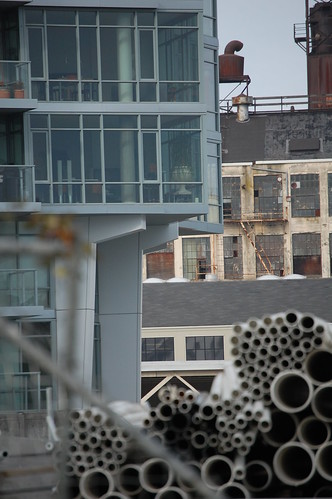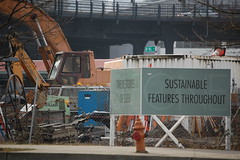We are all socialists
by Steve, September 10th, 2009Fear mongering about socialism in America would be comical if it weren’t so damned frightening. What can the rest of the world think of us?
We spend twice as much per capita on health care, and still have tens of millions without access to basic, preventive care. Why do we pay so much and get so little? We’re the only industrialized nation on the planet without government-run universal health care.
The free market has failed miserably to provide this basic service of modern life anywhere nearly as efficiently and completely as the governments of every other industrialized democracy on Earth.
Those who bleat about “socialism” should pause and consider that insurance, after all, shares some very basic tenets with socialism, like shared responsibility for the greater common good. Moreover, the so-called free market would collapse without the socialized infrastructure that supports it. Take, for instance:
- Our virtually 100% publicly-owned and maintained road system, from city streets to interstate highways
- The air traffic control system
- The self-funded, surprisingly efficient US Postal Service
- Our public schools (lord knows I’ve had some criticisms of our local system, but it beats the alternative)
- Public colleges and universities
- A multitude of public water and sewerage systems
- Many local public power systems and the federally-regulated national power grid
- Federal unemployment insurance
- Federal subsidy of an inadequately low minimum wage (the earned income tax credit)
- And, of course, on-demand bailouts of the private financial system, whenever it gets itself into a pickle
Then of course there are all those horrible socialist “extras” like:
- Libraries
- Parks
- Rec centers
- Concert halls
- Theatres
- Art galleries
- Mass transit
That’s right, folks, if you use any of those things (and you’d have to live off-grid in the wilderness to avoid them), you benefit from “socialism.” Has it taken away your freedom? Isn’t all government bad? Perhaps you should try living in Somalia for a while to experience the true libertarian paradise of no government. Don’t forget to pack your AK.
Two of the most popular government programs in the history of our nation are Social Security and Medicare. The only complaints are that they may become underfunded, and Medicare doesn’t cover enough. But nobody complains about inefficiency.
The single easiest thing we could do to solve our health care crisis (not just kick it down the road a few years) is to go to a single payer system like the rest of the industrialized world. Expand Medicare to cover all citizens, paid for with a payroll tax as it is today. Yes, your medicare tax would go up, but you would no longer have an insurance premium. Worst case, it would be a wash, but more likely, your out of pocket expenses would go down as we eliminate a significant amount of overhead currently going to duplication of administrative services, profit, and executive compensation.
The fact that this simple, efficient and cost-effective solution isn’t on the table is indicative of the power the insurance industry has over President Obama and Congress. The fact that so many Americans fear even a modest expansion of public health insurance is indicative of not only American provincialism, but also of the dearth of real news reporting that goes beyond repeating the industry message.
Single payer rally and march
by Steve, June 22nd, 2009- Wednesday, June 24th, 11:45 am
- Federal Building, 1220 SW 3rd Ave., Portland
Come help tell Senator Wyden we want everybody in and nobody out!
Gather at the Federal Building (1220 SW 3rd Ave) at 11:45 to hear doctors, nurses and patients speak about our broken health care system and how we can fix it!
We will be highlighting the huge campaign contributions from the medical industrial complex to Senator Wyden, and demanding that he represent his constituents. The majority of the American people believe that the best solution to our health care crisis is to get the insurance companies out of the way by creating a single payer system. We will then march to the Regence Blue Cross/Blue Shield office at SW 2nd and Market to highlight Regence’s campaign contributions to Senator Wyden and their outrageous rate increases over the last two years.
For more information contact Margaret Butler at Jobs with Justice:
margaret@jwjpdx.org
Eat the rich!
by Steve, June 18th, 2009The World, a cruise ship that has been converted to a cross between a Pearl district condo tower and the world’s largest SUV, has been moored downtown all week. With 165 multi-million dollar condo units, 270 crew members, five restaurants, a pool and a theatre on board, The World has the equivalent of a small municipal power plant on board spewing carbon and particulates into our fair city for the benefit of its ultra-rich owners. Continuous circumnavigation is a hell of a lifestyle, but not exactly what you’d call “green” or “sustainable.”
The Oregonian ran a cute little puff piece today, giving credence to cruise ship industry flacks (“Travel experts”) claiming these people are spending $125 a day per couple in Portland during their stay. The travel agency that arranged their shore leave claims it could closer to $400.
Whoopee!!
Meanwhile, as the idle, profligate rich enjoy breakfast on their balcony, and as we bask in the glory (envy?) of their extravagant lifestyle, the City of Portland announced the elimination of 90 jobs previously thought safe, with another 45 jobs in jeopardy and furloughs for those lucky enough to keep their jobs.
The new Gilded Age is upon us.
Why not single payer?
by Steve, March 29th, 2009I’ve been pretty hands-off on the new prez, at least publicly. But I keep asking myself a couple things. First, why they hell haven’t we nationalized the banking system yet? Second, why the hell isn’t Obama talking about single payer health care?
(Of course we knew ahead of time that Obama is something of a market fundamentalist, so we already know the answer to those questions.)
“Medicare for all” is the smartest thing we could do for the economy. It would eliminate the wasteful, burdensome, redundant and immoral private health insurance racket in one fell swoop, and eliminate the leading cause of personal bankruptcy in the US.
Even if Obama isn’t willing to consider it, circumstances may eventually force the issue. Meanwhile, a grassroots groundswell is building, with Laborer’s Local 483 among Portland unions to endorse passage of HR 676, the United States National Health Insurance Act.
I urge you to join with the laborer’s in calling your US Rep and encouraging them to support HR 676.
Portland’s urban renewal piggy bank gone bust?
by Steve, March 13th, 2009This week’s celebrity slap-down between city commissioner Randy Leonard and county chair Ted Wheeler may signal the beginning of the end of an era in Portland development. (Warning: wonkishness ahead.)
First, let’s talk about how urban renewal, a.k.a. Tax Increment Financing (TIF), is supposed to work (and has, in fact, worked in some cases in Portland).
- City leaders identify a part of the city that is “blighted” and draw a line around it. This is an Urban Renewal District (URD). Ideally (though state law is vague on this), “blighted” would mean that the property values within this area are stagnant of falling.
- The city identifies infrastructure projects that would spur private investment to improve the property values in the URD, and borrows money (through the issuance of municipal bonds) to pay for these projects. For the life of the URD, property tax on incremental increases in the value of properties is diverted from the usual recipients (city, county and school district general funds) to pay off the bonds. So, for example, if a property within the URD increases in value from $100,000 to $125,000 in the first year, all of the property tax on the additional $25K in value goes to pay off the bonds.
- When the bonds are retired, the URD can also retired, and the city, county and school district all receive higher revenue because of the increased value of the properties.
Now, that’s how things are supposed to work, but even in this best case there are plenty of critics. Minority communities have frequently been displaced, so urban renewal is broadly viewed as a tool of gentrification by those being “renewed” further to the fringes of society. But it gets even worse when the process is inverted as it was with the Major League Soccer deal.
Instead of identifying a blighted area, then determining infrastructure needs, city leaders identified a suposed need (renovation of a municipal stadium — whose recent renovation is still being paid off — to accommodate a private sports team investor), and then tried to create an urban renewal area to help fund it. Among other problems, the area around the stadium is distinctly not in danger of stagnant or falling property values. It is prime urban real estate, with a great deal of recent high-end commercial development.
This new urban renewal district (taken out of the deal by amendment before the deal was approved) would have directly deprived struggling county, school district and city general funds of millions of dollars over its life time.
It’s entirely disingenuous to claim the properties around PGE Park will not increase in value without another renovation to the stadium, and that we thusly wouldn’t be taking money from the county or schools.
Even Randy Leondard, while protesting that the debate has been uninformed, ultimately seemed to concede the point. Yes, we take the money, he seemed to say, but we’ve always been there for the county in times of need (“Good as we’ve been to you!”). And look at all we’ve build with it! It’s a very paternalistic attitude, and that was not lost on Ted Wheeler.
The reality, beneath the veneer of a bunch of euro-trash wannabe soccer fans rallying for a “major” league team, and urban renewal boosters’ insistence that building new stadiums for millionaires is the best kind of economic stimulus we can do, is that Merritt Paulson is in over his head with his baseball lease at PGE Park. His triple A Portland Beavers draw just over 25% of capacity. Paulson is paying not just current rent, but also back rent for the previous millionaire failure of a minor league sports team owner. That’s a gift to Portland’s civic leaders, who have egg on their face for that previous failure (not to mention the bonds they have yet to retire from the previous renovation).
Paulson’s lease is up in 2010, and if he takes his team to Tuscon, we’re stuck holding the bag on PGE Park’s last renovation with no tenant to pay for it.
Most of Portland’s glitzy development, including its tightly stretched bubble of a condo market, has been subsidized with urban renewal dollars. City leaders have taken advantage of vagaries in state law to use urban renewal as a piggy bank to subsidize Portland’s wealthiest land owners and create “iconic” projects for their own portfolios.
In the end, it’s about civic priorities. If we draw URDs around areas where property values are not stagnant, we directly impact city, county and school district general funds that pay for basic social services, schools, and infrastructure for the rest of the city. Maybe that’s what we truly want as a city. But let’s be clear about it when we do so.
A lot of this TIF mania can be traced to members of the old Neil Goldschmidt gang and the local commercial real estate mafia that has been their patrons. With our first publicly financed city commissioner (Amanda Fritz) leading the loyal opposition to this latest boondoggle, and with emboldened county chair Wheeler and school board co-chair Trudy Sargent at her back, maybe we’re seeing the beginning of the end of this kind of irresponsible finance scheme.
Well, a guy can dream, can’t he?
Industrial Portland
by Steve, February 8th, 2009Atheists, welcome. Socialists? Not so much.
by Steve, January 20th, 2009I should be thrilled, as an atheist, to be on President Obama’s short list: “Christians and Muslims. Jews and Hindus — and non-believers.” Seriously. For all the God goin’ around today (some of it a tad — ahem — intolerant), I was surprised to get an atheist shout-out. (As for my Sikh, Buddhist, Wiccan, Pagan, Confucianist, Shintoist, Jainist, Bahá’í, and agnostic brothers and sisters, they may not feel so special being grouped in with us non-believers.)
Less surprising was President Obama’s ode to the market and its “power to generate wealth and expand freedom.”
Well, it’s sure provided the idle rich with a lot more wealth and freedom over the past 30 years, but any student of economics knows the market doesn’t create wealth. It merely distributes wealth, which is created from capital and raw materials by human labor. The market has proven itself very adept at the upward redistribution of wealth from those who create it to those who finance it.
Obama’s proposed trillion dollar (we all know it’ll get there) stimulus plan is a bastard child of New Deal-style public works investment and Reagan-era trickle down (better-termed “shovel up”) economics.
Them rich capitalist bastards don’t need any damned retro-active tax breaks. In fact, we need to levy a wealth tax on their accumulated capital, and use it to finance even more public investment. The kind that not only builds roads and schools, but also reinforces our tattered social safety net with universal cradle-to-grave health care.
Don’t get me wrong, folks. I’ve been doing the happy dance all day, ‘cuz George W. Bush went riding off into the sunset today, and the election of Barack Hussein Obama II is undoubtedly one of the most important milestones in our nation’s history. His suspension of the kangaroo court at Gitmo is a significant ray of hope, even as he continues the jingoistic talk of being “at war, against a far-reaching network of violence and hatred.”
(The notion of a “war on violence” is more ironic than a “war on terror” is risible, and equally absurd, isn’t it?)
So much for a new New Deal
by Steve, November 26th, 2008Obama’s selection of Paul Volcker and Austan Goolsbee to head his economic team says it all.
Volcker, Fed chairman under Carter and Reagan, is the architect of modern fiscal policy (“monetarism”) that manipulates interest rates (that is, the supply of money) as a tool to control growth and inflation (vs. the previous policy of targeted interest rates). In the face of stagnant growth and persistent inflation, Volcker ratcheted up interest rates, with the prime ultimately hitting 21.5%. This contributed to the 1981 “Reagan recession”, then the largest economic downturn since the Great Depression. Yes, he “licked inflation” (of which wage growth is a major component) to the delight of Wall Street, but at the cost of millions of jobs.
Goolsbee is a University of Chicago economist. Yes, that “Chicago School”, bastion of libertarian market fundamentalism. Naomi Klein, in The Nation June 12, wrote that Goolsbee is
on the left side of a spectrum that stops at the center-right. Goolsbee, unlike his more Friedmanite colleagues, sees inequality as a problem. His primary solution, however, is more education–a line you can also get from Alan Greenspan. In their hometown, Goolsbee has been eager to link Obama to the Chicago School. “If you look at his platform, at his advisers, at his temperament, the guy’s got a healthy respect for markets,” he told Chicago magazine. “It’s in the ethos of the [University of Chicago], which is something different from saying he is laissez-faire.”
So when Obama talks about creating 2.5 million jobs, one may wonder whether he will attempt to do so by continuing the bipartisan Bush bailout of the greedy corporate sluts who got us into this mess, or if he’ll follow the lead of FDR and invest directly into the creation of jobs.
With Volcker and Goolsbee having his ear, you’ve got to assume he’s not going to start with FDR-style Keynesianism (even if conditions ultimately force that course). Unfortunately, it’s looking like Obama is going to take a detour through modified Hooverism before he gets it right.
So you want to be a barista
by Steve, November 21st, 2008Maybe it’s the economy. Or maybe it’s just the way evil do-gooders do business. But have you ever seen a five-page application (PDF) to work in a coffee shop?
Besides the usual work history and contact information, they want you to write a short essay about why you want to work at Ladybug Organic Coffee Company. They also give you a cutesy “pop quiz” with the following questions:
- Please tell us about a time that you provided excellent customer service. (Well, there was that one time at Mickey D’s…)
- What one thing makes you absolutely stand out above the rest? Why should we hire you over applicant X? (Because I wasted an hour of my life answering these ridiculous questions?)
Okay, no big deal so far, but then it starts getting good:
- What is the most important thing that you have ever learned and how has it changed your life? (Well, there was that time I stayed up all night drinking Mountain Dew driving a school bus to a Grateful Dead concert, then took a Xanax to get a couple hours of sleep before waking up and dropping acid for the show. I learned to never, ever, sleep under the school bus after the show, because some drunk deadhead might come and pee on your leg. Man, what a show, though. Jerry changed my life that night.)
- What are your greatest strengths, the things about yourself that cause you greatest pride? (Ah, pride, that deadly sin that employers always want us to indulge in. Well, I’m pretty proud of my gluttony and sloth! And I’m pretty good with lust, too.)
- What are your greatest weaknesses, the things about yourself that you could benefit the most from working to improve? (It’s okay to have weaknesses! Unless of course, you’re Superman or Wonder Woman!) (Dude! Speaking of lust! Wonder Woman! Wonder Woman! All the world’s waiting for you, and the power you possess! In your satin tights, fighting for your rights and the old red white and blue! Wonder Woman! Wonder Woman!)
- Tell us about your best friend and why they are a part of your life? (Would that be my best real or imaginary friend?)
- What is something that you do on a regular basis to make the world a better place? (I believe… Just by waking up every day, and walking lightly on Mother Earth, and smiling at strangers, I make the world a better place.)
- What is one thing that you think would make Portland a better city? (Ooh! Ooh! Ooh! I got this one: More coffee shops?!?)
Then there’s a whole series of yes/no questions:
- I can usually work weekends. No.
- I get along well with many different types of people. Yes, as long as they’re cool.
- I am always upbeat and positive Always? Uh, well, no, I guess not. I mean, I’m mostly always upbeat, just not always.
- I can work during most holidays. No.
- I enjoy working evenings. No. I mean, wait, that means I can sleep in, right? Yes.
- I am a problem solver. Depends. What kind of problem?
- I enjoy getting up early. I prefer staying up until it is early. Is that a problem?
- I like to work by myself. Absolutely! Then I can smoke out in the cooler.
- I pay attention to details. When I come out of the cooler, all the details are so, like, intense, man!
- I am a good listener. I’ve listened to every bootleg of the Dead at least six times
- I like to clean. Who doesn’t? Whenever I’m out of weed, I clean my roommate’s bong and get a couple good hits out of it.
- I am a quick learner. What was the question again?
- I can multi-task. I can kick a hacky sack while reciting the set lists from the Dead’s last six shows at the Greek Theater in Berkeley.
- I am self-motivated. Everything’s cool, man. Stuff will get done.
And finally: “Last question. What one word describes you best and why did you choose that word?”
I’d have to say “cool.” Because if you’re not being cool, man, you’re being uncool. Nobody likes it when you’re uncool. I think it would be cool to work at your coffee shop! Is there, like, a dress code or anything?










